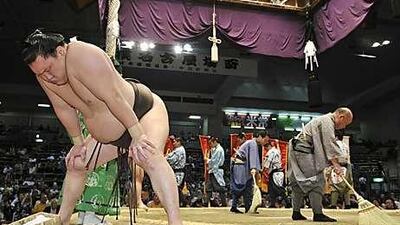NAGOYA, Japan // Sumo is more than a sport to Japan. It is a bastion of traditional culture and a matter of national pride. Wrestlers are not just athletes; they are role models and, often, larger-than-life heroes. Unless, of course, they are getting busted for smoking marijuana, breaking noses in drunken brawls or hobnobbing with gangsters.
And, these days, that is pretty much all the time, a situation which is causing the Japanese much consternation. Recent police investigations have exposed the colourful sport's cosy connections to the yakuza underworld, outside-the-ring violence and widespread recreational drug use, dragging sumo's venerable image through the dirt and prompting many to wonder if it can stand up to modern scrutiny.
Sumo's unrelenting scandals have disillusioned the public so profoundly that Japan's public broadcaster, for the first time since 1953, has pulled the sport's current tournament from the air, scrapping three hours of live, daily coverage for a 20-minute program of taped highlights. At the 15-day contest now under way, where the stands are only about half full, police officers prowl the entrances under signs saying, "Gangsters Keep Out".
"It's a very tough situation for the wrestlers," said Tamako Imoi, a 63-year-old fan. "I love the sport; that's why I'm here. But I don't want them hanging around with criminals. They should live up to their traditions." Sumo's latest quagmire involves a criminal investigation into dozens of top wrestlers and coaches who allegedly wagered tens of thousands of dollars on baseball, with gangsters as go-betweens.
The scandal started in the tabloid press, which has long alleged sumo is rife with underworld influences, including bout-fixing - allegations officials have repeatedly denied. This time, however, the charges have stuck. The popular wrestler Kotomitsuki, who held the sport's second-highest rank, admitted last month he bet on professional baseball. Police say he was then extorted by a gangster who threatened to go public. Soon after Kotomitsuki's fall, the coach Otake, who is a former wrestler, cried on national television as he acknowledged running up gambling debts of more than US$50,000 (Dh183,650).
The sumo association sidelined both, and punished more than a dozen others: an unprecedented seven top wrestlers are sitting out the tournament. The association's chief was temporarily replaced by a former public prosecutor. "The crisis that we face is one unlike any we have experienced before, and we apologize to our fans," said the outgoing chairman, Musashigawa. Many sumo watchers say the latest scandal merely underscores a close relationship sumo has had with gangsters for decades, a relationship they say is likely to continue.
"Sumo is involved in organized crime because they've had a symbiotic relationship for years," said Jake Adelstein, a former crime beat reporter for a Japanese newspaper and author of the best-selling book Tokyo Vice. "The wrestlers and the yakuza have a macho admiration for each other. The yakuza by being seen with the sumo wrestlers, acquire 'status' and the sumo wrestlers get money, booze, food, and women."
Police anger and television's decision to pull the plug go back to an incident last year, when 55 gangsters from the notorious Yamaguchi-gumi syndicate took front-row seats at a tournament to bolster the spirits of their comrades in prison. The gangsters were visible on the live broadcasts, one of the few shows inmates are allowed to watch in jail. The incident led to punishment for two sumo elders but no criminal charges.
Sumo already was grappling with the expulsion of several top wrestlers, including two Russians, for marijuana possession and the conviction last December of a coach and his assistants for hazing a 17-year-old wrestler so harshly that he died. Earlier this year, the Mongolian grand champion Asashoryu quit the sport in disgrace after a drunken brawl outside a nightclub. As the holder of sumo's highest rank, Asashoryu's behaviour was seen as evidence of how low the sport's moral standards had fallen.
The scrutiny over the scandals has also put the spotlight on the ancient sport's troubles adjusting to Japan's modern realities. Most sumo fans are middle-aged or older. Convincing young people to watch the sport, never mind take it up, is difficult. Because of the rigours of the sumo lifestyle, fewer Japanese are willing to go pro. That vacuum has been filled by wrestlers from abroad, who now make up most of the top echelon. "We grew up with sumo, but young people today hardly ever do sumo," said Toru Ishii, a fan. "We have high standards for sumo wrestlers. This is all very sad." * AP

